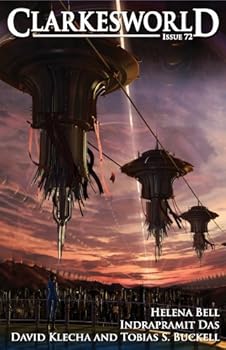 Clarkesworld Magazine is a monthly electronic publication with a strong focus on science fiction, though it also publishes fantasy. In addition, it has an unusual emphasis on nonfiction. The September issue, No. 72, contains three stories, all of which are science fiction, two nonfiction articles, and an interview.
Clarkesworld Magazine is a monthly electronic publication with a strong focus on science fiction, though it also publishes fantasy. In addition, it has an unusual emphasis on nonfiction. The September issue, No. 72, contains three stories, all of which are science fiction, two nonfiction articles, and an interview.
“The Found Girl,” by David Klecha and Tobias S. Buckell, opens this issue. It is about those left behind when the mass of humankind upload themselves into a digital, immortal existence. Unfortunately, many of those are children, a circumstance that is not explained; it seems odd that parents would leave their children behind. But then, they are not completely abandoned, for the digital world manages to interact with the bricks-and-mortar world to protect the children from the worst of what remains, both physically and in the form of human adults. The viewpoint character is Melissa, an older child who is starting to figure out what “transcendence” means. She is often charged by the electronic images that represent those who have left to accomplish physical tasks and to take care of the younger children. She finds that growing up brings unexpected challenges. She has far more choices than we do these days. It’s a different coming-of-age story than the bulk of them because of these challenges and choices, and it’s the best story in this issue.
Helena Bell’s “Robot” is a bitter story of a woman abandoned to the ministrations of a robot when she becomes ill. It is told in the second person, a list of commands and instructions by the woman to the robot. As much as the robot seems to be a blessing to this woman, she speaks to it as if she hates and resents it, even as she if forced to rely upon it as the disease she has eats her alive. The worst of it, though, is that the robot changes as it grows to know her. Is the robot intended to replace her? This story, like “The Found Girl, deals with abandonment, but in a complete different way. Both stories are made stronger for being published together, back to back.
A third look at abandonment is Indrapramit Das’s story, “muo-ka’s Child.” muo-ka is the “parent” of Ziara, the creature that makes her life on a distant planet possible. As the story opens, muo-ka has died, leaving Ziara alone in a strange place. Ziara’s story is of the symbiosis between her and this creature, and her fear about whether her own existence will continue now that muo-ka is gone. I found this the least compelling of the three stories, but still an interesting exploration of the theme.
Jason S. Ridler is the author of the first nonfiction piece in this issue, “Between a UFO and a Hard Place: The Real-Life Science Heroics of Dr. Ormond Solandt.” I had never heard of Solandt before, so this small biographical piece came as a surprise. Solandt was a Canadian scientist who became an expert on atomic energy, and specifically “an early expert on the realities of atomic warfare” after studying the impacts of the bombings of Nagasaki and Hiroshima on the Japanese people. Sadly, as the Cold War went under way, Solandt got sucked into the rising tide of supposed flying saucer sightings in Canada and the United States, serving on a committee to investigate the phenomenon, work that swallowed up his genuine scientific achievements. Ridler wrote his doctoral thesis on Solandt, which will be published as Maestro of Science: Ormond McKillip Solandt and Government Science in War and Hostile Peace by the University of Toronto Press.
The interview in this issue is a combined one of Nick Mamatas and Paul Tremblay, conducted by Jeremy L. C. Jones, and discussing the role of satire in their work. The interview reads as if it were conducted by email, rather than through a genuine three-person conversation, and there are some odd lacunae as a result, as one appears not to know what another is saying. Mamatas comes across as annoyed, even angry, at the questions asked of him. Responding to the question, “What is at stake in your new novel?” he responds, “Nothing. It’s a novel. Novels are important, they aren’t crucial to the culture. It’s a good thing, too, since these days anyone can get a novel published if he or she has an email address.” It does not seem to be an answer designed to garner him more readers. Tremblay is funnier; his response to the question, following Mamatas’s, begins, “It’s true. I have an email address.” By focusing the interview on satire specifically, Jones gives it a shape that differentiates it from the run-of-the-mill “tell us about your book” interview.
In “Another Word: Super Duper Sexual Spiritual Black Woman: The New and Improved Magical Negro,” Chesya Burke writes about a new stereotype she has noticed in the literature, a black woman who actually outshines the Strong Black Woman of myth, surpassing all the human race whose chief role seems to be to further the good of white society, even while she is not powerful enough to change her own status in the world. It’s a smart bit of literary criticism, with specific examples from several different art forms (movies, comics, novels).
Although this was the first issue of Clarkesworld I’ve read, with strong articles like these, together with entertaining stories, it won’t be the last.



This sounds worth the read! Thanks, Terry.